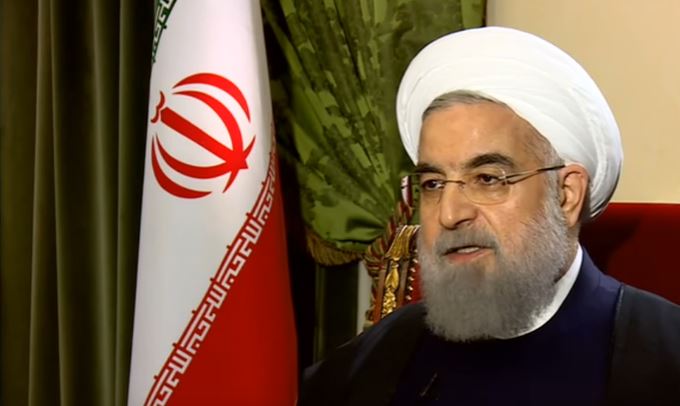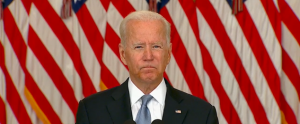
May 8, 2019. ABC News: One year after President Donald Trump withdrew the U.S. from the Iran nuclear deal, Iran has warned the pact’s remaining signatories that it would stop implementing parts of the agreement if they don’t improve economic cooperation with the country.
But while the U.S. raises its own warnings to Iran and sends an aircraft carrier strike group to the region, so far it is dismissing Iran’s statements as a bluff — and imposing new economic pressure on the Iranian government.
“We are successfully imposing the most powerful maximum pressure campaign ever witnessed, which today’s action will further strengthen,” Trump said in a statement, announcing sanctions on Iran’s industrial metals industries. “Tehran can expect further actions unless it fundamentally alters its conduct,” he said.
The new executive order, signed by the president on Wednesday, authorizes sanctions on Iranian iron, steel, aluminum, and copper sectors, which the White House said comprise 10 percent of Iran’s export economy. The sanctions could also target financial institutions or foreign countries that facilitate Iran’s export of those goods.
Iran is already struggling under intense U.S. economic pressure, desperate to drive a wedge between America and its European allies France, Germany, and the United Kingdom and secure better economic gains from the nuclear deal. In a televised address, Iranian President Hassan Rouhani said Wednesday that China, Russia, and those European powers have 60 days to improve economic ties with Iran or it will keep its excess enriched uranium and heavy water instead of shipping them overseas — two requirements of the deal.
“They’ve made a number of statements about actions they threatened to do in order to get the world to jump. We’ll see what they actually do. The United States will wait to observe that,” Secretary of State Mike Pompeo said Wednesday in London.
The top U.S. diplomat was more critical in a statement released hours later, describing Rouhani’s announcement as “in defiance of international norms and a blatant attempt to hold the world hostage.”
The increased pressure also comes days after U.S. officials said there was a credible and imminent threat from Iran or its proxies against U.S. personnel in the Middle East. Those reported threats led to the Pentagon moving the USS Abraham Lincoln and a bomber task force to the Middle East ahead of schedule and prompted Pompeo to make a last-minute trip to Iraq.
Critics charge that those Trump administration moves, in addition to others like the designation of Iran’s Islamic Revolutioanry Guard Corps as a foreign terrorist organization, have raised tensions to the point of a possible conflict. But U.S. Special Envoy for Iran Brian Hook put the blame on Iran Wednesday, saying, “We are one errant Iranian-supplied missile away from a regional conflict.”
The 2015 nuclear deal, formally known as the Joint Comprehensive Plan of Action, or JCPOA, lifted sanctions on Iran in exchange for restrictions on its nuclear program, including limits on its ability to enrich uranium. But when Trump withdrew last year, the U.S. began reimposing sanctions on Iran, targeting its revenue-rich oil and banking sectors in particular.
Iran’s economy, already troubled, has crumbled since then, with rising inflation, declining household incomes, and a huge drop in oil exports and Iran’s currency, the rial. Rouhani warned that Iran would have no choice but to break parts of the deal if it did not see any easing of economic pressure.
“If the five countries join negotiations and help Iran to reach its benefits in the field of oil and banking, Iran will return to its commitments according to the nuclear deal,” Rouhani said in a televised address, hours after Iran sent letters to each of the countries explaining its position.
But the U.S. dismissed that as “nuclear blackmail,” according to Hook: “By nearly every measure, the regime is weaker today than when we took office two years ago,” he said Wednesday. “Unless the regime demonstrates a change in behavior, the pressure will mount.”
Some analysts say the new sanction authority may also be about fomenting unrest in Iran. These industrial metal industries employ tens of thousands of working class Iranians, who largely support the regime, and the sanctions will likely trigger job losses or cuts to their income.
While U.S. withdrawal has divided it and its European allies, the United Kingdom had a sharp warning for Iran Wednesday as well. Standing alongside Pompeo, British Foreign Secretary Jeremy Hunt praised the deal as “a very important achievement of Western diplomacy,” but he called on Iran to abide by its end of the pact.
If not, “then there will be consequences in terms of how European powers react, so we urge the Iranians to think very long and hard… We strongly urge them to reconsider what they said in their letter,” he said.
European allies urged the Trump administration not to abandon the deal before last May, and since then, the two sides have tried to paper over differences by saying they share an assessment of the Iranian threat.
“We’re on the same side. We’re on the side of values-driven democracy, we’re on the side of freedom,” he said, comparing Iran to the “evil” Churchill stared down in Nazi Germany and censuring a British reporter for asking a “parlor game” question.
For his part, Hunt said the U.K. and U.S. “work incredibly closely on Iran,” noting they agree Iran must “never be able to acquire” nuclear weapons — they just have a “different approach” on how to ensure that’s the case.




